Recent Articles
How IPSA is misleading us all in trying to raise MPs wages

By now you’ll surely have seen the that IPSA, the Independent Parliamentary Standards Authority, has recommended that MPs should receive a 9% increase in their pay in 2015/16 which, on top of the 1% increases they’re due to receive in the next two year, will raise the basis gross salary for a backbencher to £74,000 a year from its current figure of £66,366 a year.
IPSA have also proposed that from 2015 onwards MP’s pay should be indexed to changes in average earnings and, as justification for this increase, has put forward the argument that since 1980, the amount we pay our backbench MPS has fallen relative to average earnings from 3.16 times the average in 1980 to just 2.7 times the average today.
Now when people start taking about averages, particularly bureaucrats, the very first question that needs to be asked is ‘which average are you talking about?’. There are three different ways in which we can calculate the average: mean, mode and median
Bsed on data from the Office for National Statistics, the mean figure for gross weekly pay in the UK in 2012 was £476.40, which scales up to an annual salary of £24,772.80 – and if we multiply that figure by three, which appears to be the figure that IPSA and other have in mind for the ‘correct’ relationship between MPS pay and average pay, then we end up with a annual figure of £74, 318.40, which is as near as damn it that figure that IPSA have put forward.
So I think we can safely conclude that IPSA’s average is the mean.
Well, the ONS figure for median gross weekly pay (excluding overtime) is just £391 and we scale that up we get an annual salary of £20,322 which, when we apply the three times multiplier for MP’s give us a figure of just £60,996.
All of which means that, just on their current salaries, backbench MPs are paid 3.27 times the average (median) salary for the UK and that will rise to 3.57 time the average (median) salary if IPSA’s proposed pay increase for MPs goes ahead, assuming that average (median) earnings rise by just 1% per annum between now and 2015.
Mark Ferguson’s argument that linking MPs pay to average earnings would provide MPs with an incentive to deliver prosperity for ordinary working people might have some merit if the link was based on median earnings.
This would at least force MPs to work to improve pay for people right in the middle of the income distribution, but its one that falls apart completely if the link is made to changes in mean earnings as this figure can be inflated simply by increasing income inequality and creating greater prosperity just for those at the top of the income distribution while allowing the wages paid to ordinary working people to remain flat, if not decline.
If the last few years should have taught us anything it’s that just about the last thing we need to doing in providing backbench MPs with a financial incentive to work towards increasing the bonus payments paid to bankers and city traders in order to up their own salary.
—
A longer version of this post is here
Why Cameron faces stiff resistance to gay marriage: mapping the UK religious right
Given the debate in the House of Commons, I think it’s well worth reflecting on exactly where opposition to equal marriage is coming from and, particularly, how that opposition is being organised.
As far as public opinion is concerned, YouGov President Peter Kellner laid out the actual position with admirable clarity yesterday:
The passions of grass-roots Tories who are bitterly opposed to same-sex marriage are not shared by the wider electorate. Most voters back a change in the law – and very few opponents are willing to switch their votes because of this issue.
…
So, among the public as a whole, 4% are pro-same-sex marriage AND say this is a vote-deciding issue, while 3% are in the opposite camp. Among those who voted Conservative in 2010, just 6% say this is a vote-deciding issue, and they divide 3-1 against same-sex marriage. So even there, the net effect is tiny.
So, not only do a majority of the public support marriage equality but its also anything but the political hot potato that its (mostly) Tory opponents are trying to make out.
However, one issue not many pick up on is the parallel problem of ‘organisational capture’, i.e. what us lefties used to refer to as ‘entryism‘.
In simple terms, it is not simply a matter of the decline in the mass membership of political parties, and other organisations, leaving them increasingly at the mercy of their residual ‘swivel-eyed’ activist rump. It also leaves them in a position where, starting at the grassroots level, they become increasingly susceptible to capture by organised minority interest groups intent on using the party/organisation as a vehicle to push their own narrow agenda.
Although this is problem that is, historically, most closely associated with the political left, and in the UK particular with the takeover of the Labour Party Young Socialists and Liverpool City Council by Militant, it is an issue that is increasingly coming to bedevil conservative politics, particularly in the United States. For example, one of the more alarming and poignant stories to emerge from the 2010 US election was that of Bob Inglis, a former Republican member of the US House of Representatives who was deselected in 2010 after losing a primary to Tea Party-backed candidate.
You might think this can safely be filed away under ‘only in America’, but don’t be so sure.
Take a good hard look at the following chart which I’ve put together in an attempt to map the many connections that already exist between our own right-wing Christian lobby and both their US counterparts and, more importantly, with a wide range of British conservative political organisations and politicians.
The map, which is far from complete, shows the extent to which our own religious lobby has already forged connections and assumed positions of influence throughout the right-wing/conservative movement in Britain.
It also shows the extent to which political opposition to measures such as equal marriage and legal access to safe abortion services originates with and is tied into a very narrow range of closely connected religious groups.
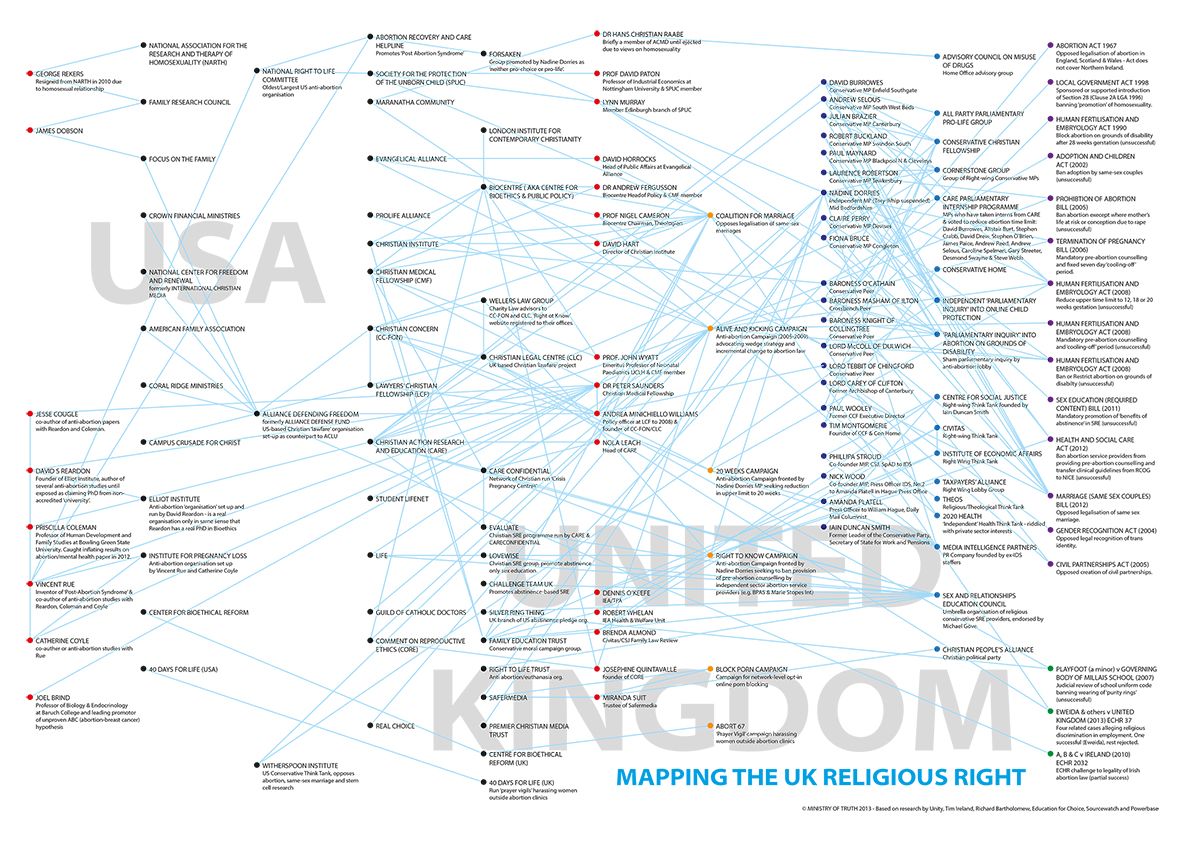
(download as a print quality PDF, 1mb)
If you think that the religious right in Britain is no more than a bunch of fringe evangelical groups with few connections and very little political influence, this chart may well persuade you to think again.
—
A longer version of this post is here.
Why Nadine Dorries is so eager to go into an alliance with UKIP
You would normally expect an MP who has only just had their party whip reinstated after a six month suspension to lie low for a while but not Nadine Dorries. She wants an alliance with UKIP.
But thy is Dorries even talking about the possibility of running on a joint Tory/UKIP ticket?
Well, the answer almost certainly lies in this recent YouGov poll:
New YouGov research conducted just before her party membership was reinstated reveals that 43% of Tories would have supported the party’s decision to reinstate her, while 45% think she should not be allowed to rejoin the party.
That’s right, more Tory voters would rather have seen Dorries left out in the cold than were happy to see her readmitted to the party and the figures amongst UKIP voters are not that much better:
The poll also suggests many UKIP voters may be relieved the Conservative Party took Dorries back. 35% of UKIP supporters think their party would be less credible if Nadine Dorries were to join it, compared to only 7% who think it would be more credible.
Oh dear…
Even allowing for UKIP recent performance in the local elections and expectations that it will perform extremely well in next year’s European elections, one would not normally expect to see a self-styled Eurosceptic MP in a historically very safe Tory seat sweating over the possibility of UKIP running a candidate against them at the next general election.
If nothing else, the majority of incumbent Tory Eurosceptics have a personal vote and a track record to call upon that means that’s unlikely that they local electorate will seek to punish them for what they perceive to be Cameron’s follies but Dorries is not in anything like that position thanks to her own past conduct – and I’m not just talking here about her skipping out her constituents for more than three weeks to appear on “I’m a Celebrity…”.
There’s also the little matter of her using her personal ‘blog’ to mislead her own constituents as to the actual location of her main home, while claiming for her constituency home on expenses, her habitual use of her own parliamentary office as a job creation scheme for her own daughter and, of course, the ongoing investigation by IPSA into expenses claimed since the last general election for the rental of flat in Pimlico that, as I revealed last week, she used overnight for a total of just 25 nights in the whole of 2012 while, at the same time, claiming just over £4,000 to cover the costs of make a daily commute to Westminster from her constituency home, and back, eighty-six times.
The full figures are, I think, well worth repeating:
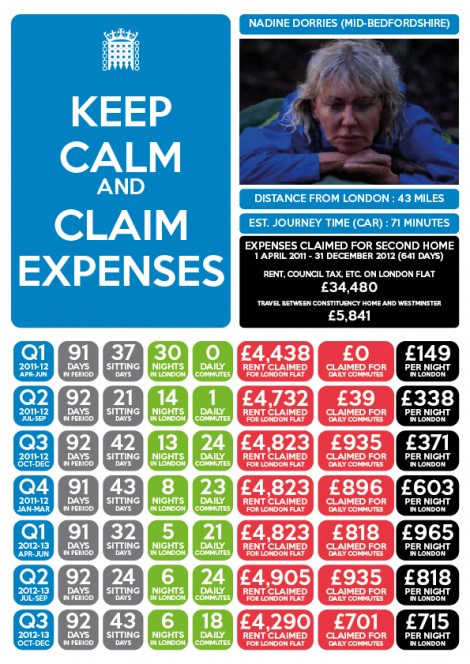
It doesn’t take a genius to figure out, based on YouGov’s polling and her own track record, why Dorries is talking up the idea of trying run on an joint Tory/UKIP ticket.
It’s not that she fears that a UKIP candidate in her constituency will be able to exploit Tory divisions over Europe but rather that by running on anti-politics ticket, UKIP may very well be in a position to exploit her own personal unpopularity amongst her Tory voters and her dubious track record on expenses to, at the very least, take a sizeable chunk out of her majority, if not pose a serious threat of unseating her.
This is not about confusion amongst members of her own constituency association, it’s purely about trying to keep UKIP out of her constituency in the interests of self-preservation and not losing her main taxpayer-funded meal ticket.
She is, as Margaret Thatcher might have put it, ‘Frit’.
Has Nadine Dorries MP not been paid for her recent media appearances?
Almost six months on from her all-too-public appearance on ‘I’m a Celebrity Get Me Out of Here’, Nadine Dorries still hasn’t registered her income from appearing on the show with the House of Commons authorities.
In fact, according to the most recent edition of the House of Commons Register of Members’ Interests she hasn’t declared any outside interests or earnings since June 2012, although she did register a gift in kind from Conservative Home in October 2012, which consisted of a Conference Pass, accommodation and travel for last year’s Conservative Party Conference, valued at £700.
That’s a little odd isn’t?
Between August 2011 and May 2012, the Register of Members’ Interests shows that Dorries was paid:
– £1,900 by the Daily Mail for two articles published between August October 2011,
– £5,000 by the Mail on Sunday for articles published between January and May 2012,
– £1,440 by Hat Trick Productions for an appearance on Have I got News For You in May 2012,
– £300 by The Sun for articles published in May 2012,
– £300 by H Bauer Publishing for articles published in Bella Magazine in May 2012, and
– £3,000 by Conservative Home for a writing weekly column between January and May 2012.
However, since that last set of registrations in June 2012, Dorries has registered nothing whatsoever in terms of remunerated outside interest despite appearing on ‘I’m a Celebrity…”, continuing to write a regular weekly column for Conservative Home and signing with a showbiz agent, ASM Damage, where her profile notes an appearance on Channel 5′s ‘The Wright Stuff’ in June 2012 which has also yet to make an appearance on her register entry.
To be clear about the rules, MPs are required to update their register entry with any new registrable interests, such as payments for key work undertaken outside the House, within four weeks.
That being the case, how has Dorries managed to go almost six months without registering her payment for appearing on ‘I’m a Celebrity…’?
Her own private company?
One way in which Dorries could avoid registering payments for media work as paid employment would be to set up a service company to receive the money on her behalf and then pay it on to her as an employee of that company, or via a remunerated directorship or perhaps even in the form of shareholder’s dividend.
She would still have to declare any such payments on the register but this would at least help to avoid disclosing exactly how much she’d been paid for specific gigs and, depending on how these payments are made, she would also be able to pay a bit less tax on her outside income.
And sure enough, about a month before Dorries jetted off to the Australian jungle (3rd October 2012) records at Companies House show that Dorries was appointed as the sole director of a Staffordshire-based company called Averbrook Limited.
Averbrook Limited also has yet to make an appearance on Dorries’ register of interests.
Averbrook Limited
Now this is where it gets interesting because Averbrook Limited is not a new company at all.
It was originally set up in May 1994 by three business consultants but was then taken over in November 1995 by an Andrew James Rayment, a former teacher with a somewhat intriguing commercial history if an article which appeared in TES in June 2011 is anything to go by.
As recently as August 2010, so far as I can confirm, Rayment was also the Chairman of Mid-Bedfordshire Conservative Association. Averbrook’s financials show the company has been dormant since 2006 and that it hasn’t done any significant trading for a fair bit longer than that, with Rayment as its sole shareholder and Company Secretary, with a nominal holding of just £100, and his wife serving as its sole director.
Or at least that was the case right up until end of March 2012 when Rayment’s wife suddenly stepped down as a Director with Rayment seemingly following her out the door, at least on paper, six weeks later, at which point its registered office and the position of Company Secretary were both transferred to an accountancy firm in Newcastle-under-Lyme.
And there it sat, until early October 2012 and Dorries’s appointment as a director, in which she her occupation as “writer/commentator/TV Radio personality” (but not MP), all of which came on the same day that the accountancy firm resigned as Company Secretary.
Why hasn’t Dorries declared it?
MPs are required to register any remunerated directorships, not matter how much remuneration they receive, and any directorships for which they are not individually remunerated but nevertheless receive payments for via another company in the same group.
There also required to register an interest in any company in which they hold at least a 15% shareholding.
So, if Dorries receives any kind of payment from Averbrook for media work that’s been routed through the company, as either an employee or as a director, or if she owns more than 15% of the shares in the company then it has to be registered with the House of Commons, which means either than she’s failed to register an interest in line with the rules or that she hasn’t received any payments from Averbrook and doesn’t own at least 15% of the company’s shares.
Which leads us back to the question of what, exactly, has happened to her appearance fee from ‘I’m a Celebrity…’?
This is all legal and above board, but nevertheless her constituents and even some members of her local association might be inclined to wonder why the MP isn’t showing more transparency.
Update: Ms Dorries has said on Twitter that she hasn’t been paid for appearing on I’m a Celebrity.
—
A longer version of this post is on Unity’s blog.
Convictions for rape: how the Crown Prosecution Service is misleading us
According to the Crown Prosecution Service, rape convictions have hit an all -time high:
The Crown Prosecution Service has today published new figures that show the conviction rate for rape and domestic violence prosecutions increased once again last year.
The statistics show that the conviction rate for rape prosecutions has continued to rise to the highest on record, from 58% in 2007/08 to 63% in 2012/13. CPS recorded data on rape prosecutions includes all cases initially charged and flagged as rape, including those cases where a conviction was obtained for alternative sexual offences or serious offences of homicide or offences against the person.
Ah, but have you noticed the caveat in paragraph 2?
In the parallel universe that bureaucrats inhabit a ‘rape conviction’ is not actually a conviction for rape, it includes any conviction is a case that was initially charged and flagged as a rape, even if the actual rape charge was dropped before the case reached court or the defendant was acquitted of rape but convicted on a lesser offence.
In short, however good the overall conviction rate in these case might now look on paper, the claim that rape convictions have hit an all-time high is bullshit, a point that I made back in March 2012 when they tried the same bullshit arguments.
I’ve pulled together this [hopefully] handy infographic which lays out the truth about rape – from the British Crime Survey estimates for annual prevalence of rape and other serious sexual offences, to the CPS’s own audited figures for outcomes (for cases initiated in 2009).
Starting from a annual baseline of 85,000 completed or attempted serious sexual offences against adult women in England and Wales, plus around 10,500 rapes in which the victim was a female child (i.e. under 16), the criminal justice system delivered just 802 actual rape convictions.
I.e. where a defendant was actually convicted of rape and not a lesser offence, of which over half (415) came by way of a guilty plea and just over half were for offences against children.
In short, in that audited data, less than 400 actual convictions for rape related to offences in which the female victim was aged 16 or over.
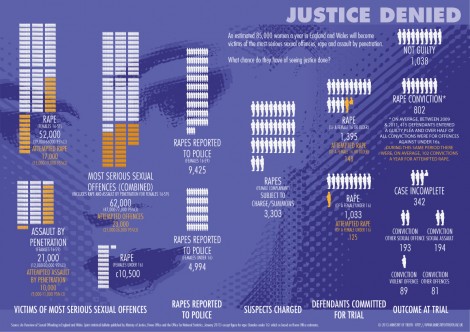
Full file here (large 6mb PDF).
Copyright notionally creative commons non-commercial licence, but I can also waive that if the poster’s being used for fund-raising purposes by a non-profit organisation.
More questions about Maria Hutchings’s CV [updated]
Political Scrapbook has revealed this morning that, despite presenting herself as an experienced business woman, Eastleigh Tory candidate Maria Hutchings has never been a director of a limited company.
But there’s more – this is Hutchings’ current Linkedin profile:
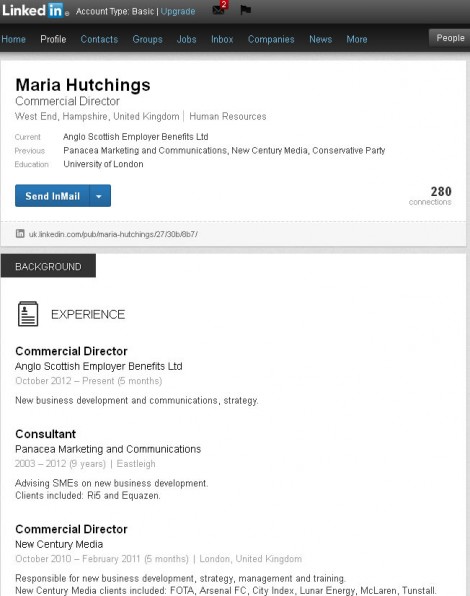
Company and Internet searches for ‘Panacea Marketing and Communications’, the ‘business’ for which Hutchings has ostensibly been working for the last nine years have, so far, turned up absolutely nothing.
Not company registration. No website. No email addresses and no references to any such business anywhere on the internet.
Nothing. Nowt, Zip. Nada. Fuck all.
[UPDATE: To clear up one point from comments, I can find nothing to connect either Maria Hutchings or ‘Panacea Marketing and Communications’ with the similarly named Panacea Marketing Ltd, which is based in Warwickshire and which most certainly is a genuine company with its own company registration, website, etc. Unless documentary to the contrary emerges it sees safe to say that Hutchings does not appear to have any connection with Panacea Marketing Ltd whatsoever.]
[UPDATE 15:00 – Oliver Duggan (@oliduggan) has managed to contact Ri5, one of the two clients listed under ‘Panacea Marketing and Communications’ and they have confirmed that the did use a ‘Panacea Marketing’ at an unspecified date prior to 2010 and that Hutchings was indeed the consultant that undertook the work.
As Ri5 have been around since at least 2000, that’s one verified piece of actual business in a 6-7 year period between 2003 and 2010 and, again, I can find nothing to link Ri5 directly to Panacea Marketing Ltd of Warwickshine, so ‘Panacea Marketing’ here may very well be no more than ‘Maria Hutchings, trading as…’
As for Equazen, there is a possible connection there going to back to the incident in which Hutchings sandbagged Tony Blair on national TV, as Equazen are/were in the fish oil supplements business. According to Skeptical Voter, Hutchings did get her face into the papers – well, the Daily Mail – way back in 2006, with claims that Fish Oil supplements had improved her son’s autism. This doesn’t appear to have helped Potters Ltd, the company behind the Equazen brand in the UK, very much as both it and Equazen UK Ltd are currently listed as ‘non-trading’ and the registration on the Equazen website, which is still going, is currently held by a German company.]
However, and this is much more interesting, Hutchings’ current ‘employer’, Anglo Scottish Employer Benefits Ltd is a new business, which was only registered in June 2012, so there is as yet no financial information for this company or any details of its trading activity.
Anglo Scottish Employer Benefits Ltd has the same registered office address as another company with a very similar name, Anglo Scottish Employee Benefits Ltd – both operate from Highfield Lodge, Burlesden.
Anglo Scottish Employee Benefits Ltd, was first registered in 2006 but company records show it to be a non-trading company. In fact, those same records show that company has never traded since it was first registered.
Both companies have the same two directors/shareholders – John Alexander Gordon Milne (age 77) and John Milne (age 43) which rather suggests that they’re father and son.
And, by what I am sure is nothing more than a complete and utter coincidence, the name of the Chairman of the Eastleigh Conservative Association, as of this article about Chris Huhne’s speeding ticket problems in May 2011 is…
Writing in Eastleigh News, John Milne – the Conservative Party Chairman for Eastleigh- speculated that Mr Huhne was only waiting for his first anniversary as a secretary of state to pass before resigning as this would enable him to leave with a ministerial pension.
In which case it seems reasonable to ask whether Anglo Scottish Employers Benefits Ltd is actually a trading company, given that Maria Hutchings currently claims on her Linkedin profile that she works for the company as its ‘Commercial Director’.
[UPDATE]
Well this is getting even more interesting…
As you can clearly see from her LinkedIn profile, Hutchings cites October 2012 as the start of her ‘employment’ with Anglo Scottish Employers Benefits Ltd.
See if you can guess when the domain name for Hutchings’ campaign website was registered before you scroll any further…?
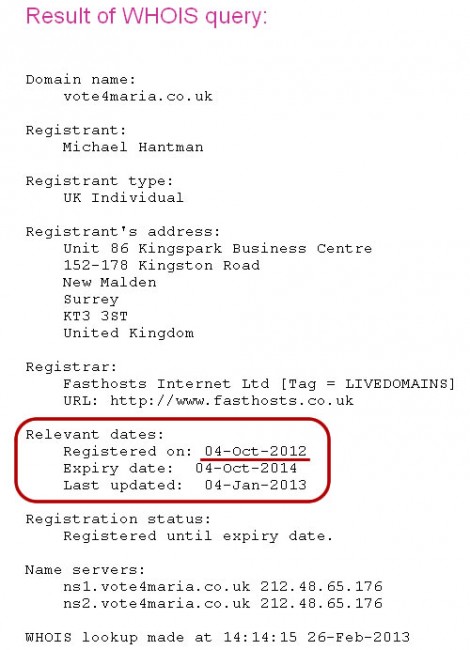
It’s not just the Met police that is failing women…
I don’t know how much national press coverage this story will get but the Birmingham Mail is reporting another sorry case of a Police officer falling down on the job:
A “rogue” policeman has quit the West Midlands force after admitting retracting a domestic violence victim’s statement without her knowledge. PC Stuart Williams, 37, resigned after pleading guilty to forgery at Coventry Crown Court on Monday. He was charged after an investigation was carried out by the Independent Police Complaints Commission (IPCC). The cop had been due to stand trial over the charge but changed his plea to guilty at the start of the proceedings. He received a four-month suspended prison sentence and was ordered to pay £2,400 costs.
Yes, you are reading that correctly.
The officer in question was tasked with investigating a complaint of harassment against the woman’s ex-partner but instead of doing his job properly he chose, instead, to falsify paperwork to make it appear that he’d been investigating the case. Then, to cap it all off, he visited the victim in April 2011, wrote up a false statement withdrawing the complaint and forged the victim’s signature to make it appear that they had asked for the case to be dropped.
Only a few months ago, Ryan Coleman-Farrow, a former detective constable with the Metropolitan Police, was jailed for 16 months for failing to investigate 10 rape cases and three sexual assaults and for falsifying records, including making entries on the police computer system which indicated that the Crown Prosecution Service had advised no further action in cases when no such instructions had been given.
The impact the Coleman-Farrow’s misconduct has had on women in London reaches far beyond the 13 cases that he failed to investigate and can be clearly seen in the Met’s own crime statistics.
The earliest round of significant publicity given to this case and concerns relating to the conduct of officers in the Met’s specialist Sapphire unit, which deal with rape investigations, occurred in May 2012 with media interest peaking in September when Coleman-Farrow stood trial and entered guilty pleas to 13 counts of Misconduct in Public Office.
Monthly statistics for the number of rapes reported to the Metropolitan Police are available from April 2011 to November 2012 and make for very interesting reading, especially when you compare the number of rapes reported from May to September 2012 with the same period in 2011.
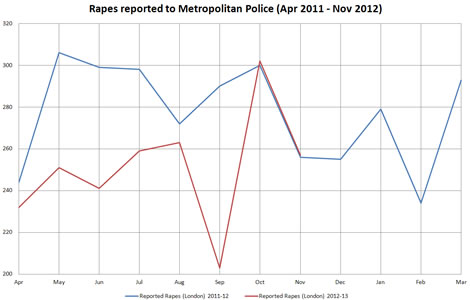
Overall, the number of rapes reported to the Metropolitan Police for that period of 2012 (1217) is just about 17% down on the same period in 2011 (1465) with the biggest fall (30%) occurring in September.
The fall in the number of rapes reported to the police also coincides with the period during which there adverse publicity being generated by the Coleman-Farrow case. Furthermore, the biggest fall over the previous year occurs in the same month as the case went to trial, allowing the full details of Coleman-Farrow’s misconduct to be made public.
In this case it looks really suspicious, enough to suggest that the likely cause of a sizeable proportion of the fall in reported rape cases during this period stems from a serious loss of confidence in police’s ability to investigate rape cases properly, particularly as the figures for October – the month following Coleman-Farrow’s conviction – appear to revert back to their usual trend.
There is far more at stake in these situations, where a serving police officer fails to carry out their duties, than just the direct impact this has on the women whose complaints aren’t fully or adequately investigated.
It damages public confidence in the police which means fewer rapes, sexual assaults and domestic violence incidents getting reported to the police and more rapists and abusers getting away with their crimes and remaining free to rape and/or abuse other women.
This kind of thing has to stop.
Dorries: ‘I’ve not taken an overseas jolly’. Untrue
Nadine Dorries wrote a self-serving pile of rubbish at Comment is Free.
Same old selective memory.
In my seven and a half years as an MP I think it is important to state that I have never taken a single day away from parliament on one of the many jollies most MPs enjoy to various parts of the world.
Oh rilly???
6. Overseas visits
11-15 June 2006, to Israel hosted by Conservative Friends of Israel (CFI). CFI contributed the costs of flights, accommodation and some meals. The Israeli Ministry of Foreign Affairs (Official Guests Department) contributed to the costs of travel inside Israel, some accommodation and meals. (Registered 29 June 2006)
Source – Register of Members’ Interests, Nadine Dorries
No, there are absolutely no foreign jollies on Nadine’s record whatsoever.

For the record, Parliament was in session between the 12th and 15th June, 2006.
Matters debated that week, while Dorries was away on the jolly she’s conveniently forgotten included the lack of progress in implementing the recommendations of the Bichard Inquiry (at PMQs) , the Electoral Administration Bill, Lords amendments to the Work and Families Bill, the Fraud Bill and a lengthy ‘European Affairs’ debate on the fallout from the failure of the EU to push through its constitutional treaty, which took lace in advance of discussions at the European Council on what would eventually become the Lisbon Treaty.
Nothing important, then.
This is the real meaning of a ‘pro-life’ stance
If you download this Powerpoint presentation, which was produced by Dr Peter Saunders of the Christian Medical Fellowship in conjunction with what was then (2007) the ‘Alive and Kicking’ anti-abortion campaign, you find a slide – number 47 – with the following title:
What about abortion to save the life of the mother?
The second of the three bullet points on that slide reads as follows:
there are no medical circumstances justifying direct abortion, that is, no circumstances in which the life of the mother may only be saved by directly terminating the life of her unborn child’. (Irish obstetricians, 1992)
Is that right???
Two investigations are under way into the death of a woman who was 17 weeks pregnant, at University Hospital Galway last month. Savita Halappanavar (31), a dentist, presented with back pain at the hospital on October 21st, was found to be miscarrying, and died of septicaemia a week later.
Her husband, Praveen Halappanavar (34), an engineer at Boston Scientific in Galway, says she asked several times over a three-day period that the pregnancy be terminated. He says that, having been told she was miscarrying, and after one day in severe pain, Ms Halappanavar asked for a medical termination.
This was refused, he says, because the foetal heartbeat was still present and they were told, “this is a Catholic country”.
She spent a further 2½ days “in agony” until the foetal heartbeat stopped.
Needless to say, one wonders now whether ‘Irish obstetricians’ – and Dr Peter Saunders, of course – would care to revise their opinion?
Somehow, I doubt that they will – the anti-abortion lobby will inevitably concoct some sort of bullshit excuse to try and conceal the despicable truth in this case, that woman a died unnecessarily and in agony because Irish Catholic doctors refused to perform a termination that could have helped to save her life.
And these people have the nerve to call themselves ‘Pro-Life’.
By using age to allocate NHS funding, Lansley rewards Tory voters
Health secretary Andrew Lansley said at a NHS Clinical Commissioners conference in April: “age is the principal determinant of health need”.
It follows from this the NHS should devote a greater proportion of its resources in areas with the largest elderly populations.
But the evidence doesn’t stack up. Furthermore, it looks like the funding is being shifted for political reasons.
continue reading… »
NEWS ARTICLES ARCHIVE


















